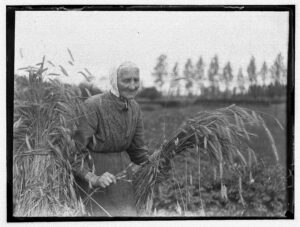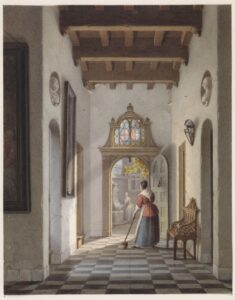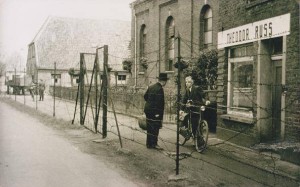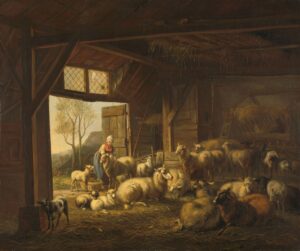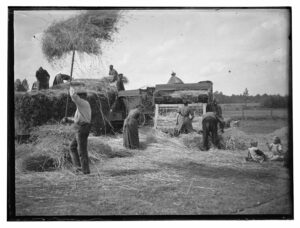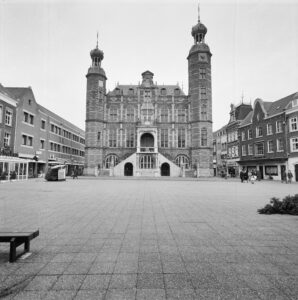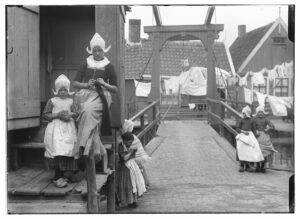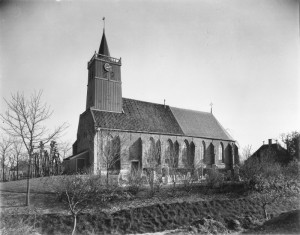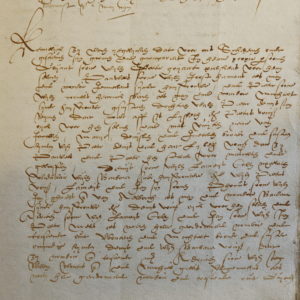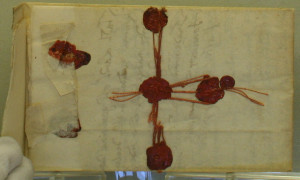A boerin is a female farmer. Women worked alongside the men on a farm. They were often responsible for the work in and around the farm, taking care of the animals and food preparation, while the men mostly worked the fields. But in August, everyone would work together to get the harvest in. … [Read more...]
Dutch term – Gang
A gang is a hallway. You may encounter the term in estate inventories, that tally the items per room in the house. … [Read more...]
Dutch term – Grens
A grens is a border. Municipal borders determined where a couple would register the birth of their child, where they were taxed, where they would apply for a permit. Judicial borders determined which court prosecuted a ciminal, granted a divorce, or appointed a guardian. Borders affected our ancestors' lives. My ancestor Arend Kastein moved across the street and tried to apply for a job as a policeman. But since that street happened to be the Dutch-German border, he needed to be … [Read more...]
Dutch term – Levende have
Levende have means livestock. You may come across the term as a heading in inventories of estates in notarial records or voluntary legal records. Just because someone owned livestock does not mean that they made their living by farming. Many people owned a goat or cow for their milk. They may have sold the surplus, but would have other means of income. … [Read more...]
Dutch term – Dorsen
Dorsen means to thresh. The person doing the threshing is the dorser. You will not often find that as an occupation as it was just one of many jobs farms or their laborers did. … [Read more...]
Dutch term – Stadhuis
The stadhuis (literally: city house) is the town hall. Town hall is where people would register births and deaths for the civil registration, and where civil marriages would take place. It was often the place where the aldermen's court convened, and where the town clerks kept their registers. … [Read more...]
Dutch term – Kind, kinderen
A kind is a child, plural kinderen. You may come across the term in wills, guardian appointments or other types of notarial and court records. … [Read more...]
Source – Church Membership Records
Church membership records or lidmatenboeken record the members of a church. Church membership records are typically kept by protestant churches, like the Dutch Reformed Church. In the protestant faith, people become members by confession of faith as adults. This is different than in the Roman Catholic Church, that considers people as members from the moment of baptism, often in infancy. Structure of church membership records Church membership records are typically kept in chronological … [Read more...]
Dutch term – Boedelscheiding
A boedelscheiding is an estate division. This often happened after someone died. An estate division record will include details about the estate and will list who got what. These records can typically be found in notarial records, or in voluntary court records before 1811 in regions where there were no notaries. If there was not much to divide, the estate may have been divided informally without there being an official record. … [Read more...]
Dutch term – Beschikbaar, beschikbaarheid
Beschikbaar means available; beschikbaarheid means availability. You may come across the terms in finding aids and texts discussing how to consult records. For example, a finding aid may include a section about availability to discuss where the records are kept, how they can be accessed, whether they are available online, or whether there are access restrictions to consider. … [Read more...]
